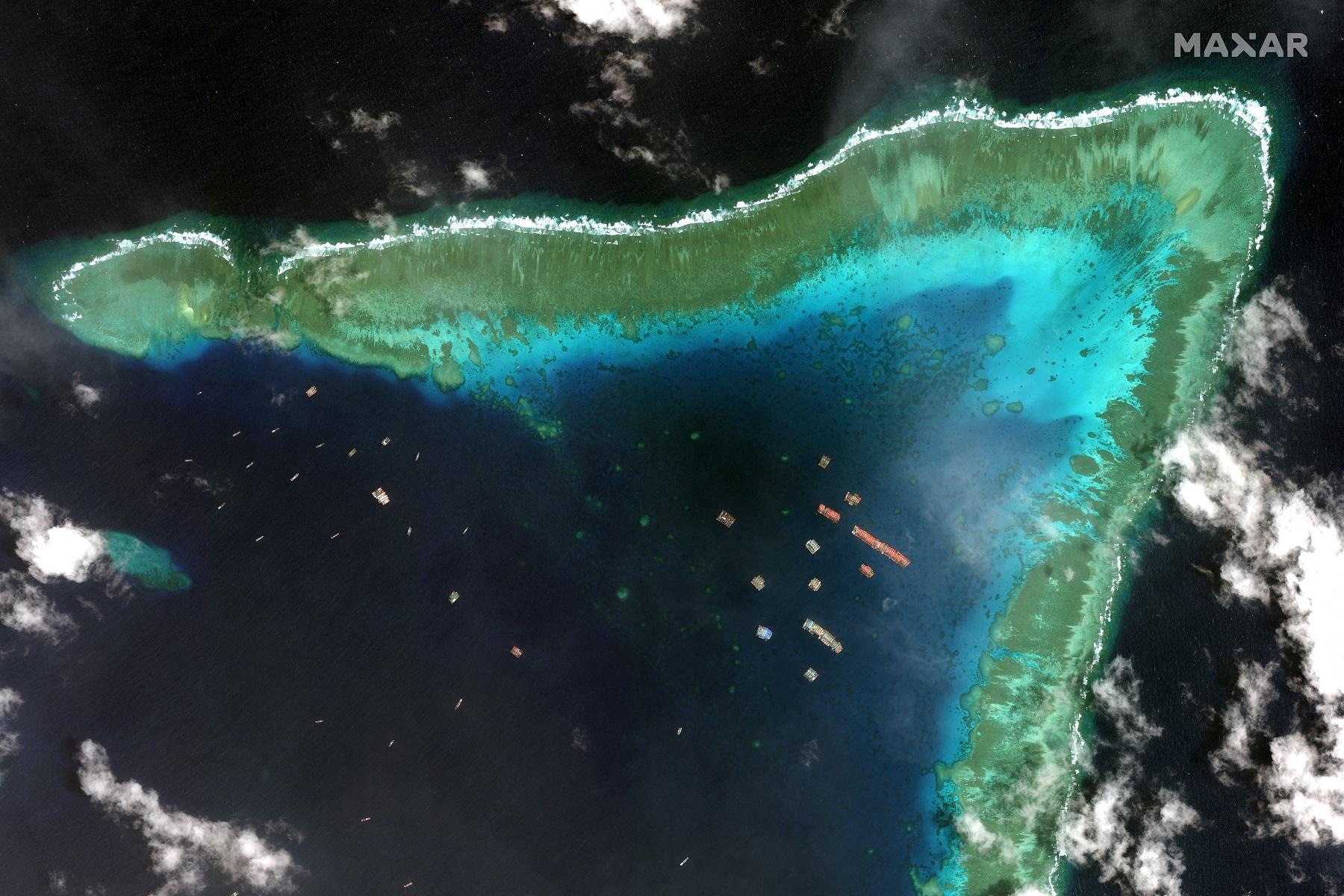DFA files two new protests vs. China as 160 Chinese vessels spotted in Philippine territory

The Department of Foreign Affairs has filed two new diplomatic protest against China after 160 Chinese vessels were spotted in Philippine waters.
In a diplomatic note dated April 21, the DFA said the presence of these vessels in the West Philippine Sea "blatantly infringe upon Philippine sovereignty, sovereign rights and jurisdiction."
"The vessels were observed within the territorial sea of high tide features in the Kalayaan Island Group, in the Philippine Exclusive Economic Zone (EEZ), and in and around the territorial waters of Bajo de Masinloc," the DFA said.
Another five Chinese Coast Guard vessels with bow numbers 3103, 3301, 3305, 5101, and 5203 were also seen deployed within the vicinities of Pag-asa Island, Bajo de Masinloc and Ayungin Shoal.
"Through these protests, the DFA reminded China that Bajo de Masinloc, Pag-asa Islands, Panata, Parola, Kota Islands, Chigua and Burgos Reefs are integral parts of the Philippines over which it has sovereignty and jurisdiction. The Philippines exercises sovereign rights and jurisdiction over Julian Felipe Reef and Ayungin Shoal," the DFA said.
The new diplomatic protests were in addition to the daily protests being filed by the DFA against the continuing presence of Chinese vessels in Julian Felipe Reef, the department said.
Despite repeated calls and protests from the Philippines, Chinese ships continue to linger in the area and have even been spotted in other parts of the Kalayaan Island Group in the municipality of Kalayaan, Palawan off the country’s northwestern waters.
"The continued swarming and threatening presence of the Chinese vessels creates an atmosphere of instability and is a blatant disregard of the commitments by China to promote peace and stability in the region," the DFA said.
China’s presence in the West Philippine Sea demonstrates its resolve to assert claims over the waters, while ignoring calls from several countries backing the Philippines, such as the United States, Japan, Australia, United Kingdom, New Zealand to leave and cease raising tensions in the area.
The DFA called on China to adhere to international law, including the 1982 United Nations Convention on the Law of the Sea (UNCLOS) and the 2016 arbitral ruling that denigrated China's massive claim over the resource-rich South China Sea.
China, a signatory to the UNCLOS along with the Philippines, does not recognize the ruling and maintained indisputable claim over 90 percent of the waters, dotted by clusters of islands, cays, shoals and reefs with rich fishing areas and natural oil and gas.
China and five other governments - Brunei, Malaysia, the Philippines, Vietnam and Taiwan - have been locked in long-simmering territorial rifts in the South China Sea that analysts feared as Asia’s next potential flashpoint for a major armed conflict.
Parts of the South China Sea that fall under the Philippines’ exclusive economic zone has been renamed West Philippine Sea by the Philippine government.
Thr DFA reminded China to abide by its commitments under the 2002 ASEAN-China Declaration on the Conduct of Parties in the South China Sea, in particular the exercise of self-restraint.
"Claimants should maintain an atmosphere conducive to the ongoing negotiations for a Code of Conduct in the South China Sea," the DFA said.
In August 2018, ASEAN and China agreed to a single draft of the code of conduct or COC, with an agreement reached in November 2018 for both sides to finalize the document within three years, starting from 2019.
Manila earlier warned that Beijing's aggressive actions can undermine the negotiations for a code aimed at restraining hostile acts in the waters.
Structures
Earlier in the day, Philippine military spokesperson Major General Edgard Arevalo said the Armed Forces is proposing the building of structures in the West Philippine Sea to protect the country’s territorial rights amid Chinese incursions.
"'Yan po ay nagsisilbing mungkahi natin sa NTF WPS at sila po ang magdedesisyon ultimately… Ang binabalak po natin ay magtayo ng istruktura," Arevalo told Dobol B TV in an interview.
(That is our proposal to the NTF WPS, which will ultimately decide on the matter. We’re planning to build structures.)
Arevalo said the proposal of establishing structures in the West Philippine Sea aims to secure the maritime and sovereign rights of the country as well as the fishing rights and safety of Filipino fisherfolk.
Among the structures that the AFP is intending to build are fisherman shelters, cold storage facilities, and lighthouses, Arevalo said, without elaborating. — RSJ, GMA News



